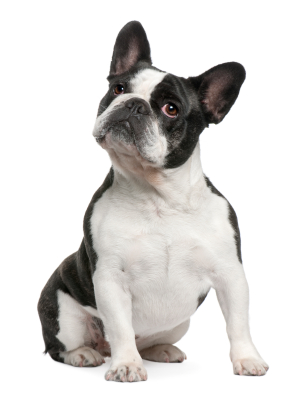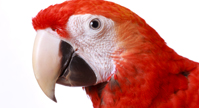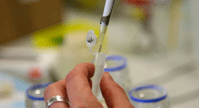Juvenile Hereditary Cataracts (HSF4)
Description:
 Juvenile Hereditary Cataracts (JHC) cause a clouding of the lens of the eye due to a breakdown of tissue in the eye. This condition generally results in an inability to see clearly and can cause total blindness. In canines, cataracts are often familial; this is known as Hereditary Cataracts. A mutation in the HSF4 gene causes this type of cataracts in several breeds of dogs. In this case, the dog is typically affected bilaterally. This means that both eyes are affected by the cataracts. The cataracts associated with HSF4 also occur in the posterior region of the lens. They usually start by being small and grow progressively, though the speed of growth is highly variable. Some cataracts will grow so slowly that the dog's vision remains relatively clear, while others will grow such a way that the dog will quickly go blind. Corrective surgery is possible, though it is costly and is not always effective.
Juvenile Hereditary Cataracts (JHC) cause a clouding of the lens of the eye due to a breakdown of tissue in the eye. This condition generally results in an inability to see clearly and can cause total blindness. In canines, cataracts are often familial; this is known as Hereditary Cataracts. A mutation in the HSF4 gene causes this type of cataracts in several breeds of dogs. In this case, the dog is typically affected bilaterally. This means that both eyes are affected by the cataracts. The cataracts associated with HSF4 also occur in the posterior region of the lens. They usually start by being small and grow progressively, though the speed of growth is highly variable. Some cataracts will grow so slowly that the dog's vision remains relatively clear, while others will grow such a way that the dog will quickly go blind. Corrective surgery is possible, though it is costly and is not always effective.
One HSF4 mutation causes the recessive form of Juvenile Hereditary Cataracts (JHC) in Boston Terriers, Staffordshire Bull Terriers, and French Bulldogs. Because it is recessive, a dog must have two copies of this mutation to experience this form of cataracts. This mutation is only responsible for early-onset hereditary cataracts, which typically occur between 12 months and 3 years of age in Staffordshires, and between 2-3 years in Boston Terriers. Boston Terriers can also be afflicted by late-onset hereditary cataracts. However, the HSF4 gene mutation is not responsible for that particular form of cataracts. The causative gene for late-onset hereditary cataracts in Boston Terriers has not been determined at this time.
It should also be noted that not all cataracts are hereditary. Cataracts can also be caused by old age or injury. Also, cataracts that occur in different regions of the lens can also be familial, however, are not attributed to this gene mutation.
Acceptable Sample Types:
Animal Genetics accepts buccal swab, blood, and dewclaw samples for testing. Complimentary sample collection kits are available and can be ordered at test now.
This Test is Relevant For the Following Breeds:
- Boston Terriers
- French Bulldogs
- Staffordshire Bull Terriers
Results:
Animal Genetics offers DNA testing for the recessive JHC allele. The genetic test verifies the presence of the mutation and presents results as one of the following:
| JHC/JHC | Affected | The dog carries two copies of the mutant gene and is homozygous for Hereditary Cataracts. The dog is affected by HSF4-Hereditary Cataracts, and will always pass on a copy of the mutated gene to its offspring. |
| JHC/n | Carrier | Both the normal and mutant copies of the HSF4 gene detected. Dog is a carrier for Hereditary Cataracts, and can pass on a copy of the defective gene to any offspring. |
| n/n | Clear | Dog tested negative for the HSF4 Hereditary Cataract gene mutation, and will not pass on the defective gene to its offspring. |
Submit a Sample for Testing:
To submit a sample for testing please go to test now.
To order a sample collection kit please go to order sample collection kits.
Cost per sample is $45.00. Please see our Canine Fee Schedule for all test rates.










